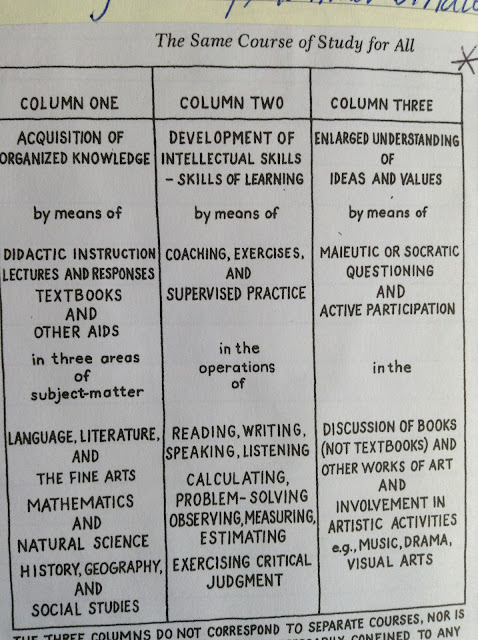Part B
Later Friday January 25, 2013
So what does Socratic
questioning LOOK like?
How does it fit into my daily
life as a teacher?
Study the chart below, taken
from the Paideia Project by Mortimer J. Adler
Socratic questioning in NOT a method for
delivering content. (Robert Bird on Youtube.)
FYI-Paideia – is a
classical Greek system of education and training; called Humanities in Latin.
The term was combined with enkyklios (complete system or circle) forming ‘encyclopedia’ to identify a large
compendium of general education. -Dictionary.com
Maieutic – (ancient Greek-Spiritual midwife) referring toquestions
that help draw out the truth and knowledge latent in a person (wikipedia)
“The Socratic method is a negative
method of hypothesis elimination, in that better hypotheses are found by
steadily identifying and eliminating those that lead to contradictions. The
Socratic method searches for general, commonly held truths that shape opinion,
and scrutinizes them to determine their consistency with other beliefs. The
basic form is a series of questions
formulated as tests of logic
and fact intended to help a person or group discover their beliefs about some topic,
exploring the definitions or logoi
(singular logos),
seeking to characterize the general characteristics shared by various
particular instances. The extent to which this method is employed to bring out
definitions implicit in the interlocutors' beliefs, or to help them further
their understanding, is called the method of maieutics. Aristotle attributed to
Socrates the discovery of the method of definition and induction, which he
regarded as the essence of the scientific method.”-Wikipedia
Finally!
The Socratic Questioning process:
(adapted from a Youtube clip)
1. Look for statements of common sense in
your curriculum area: Mine for you is:
“Questioning skills are important in the
learning process.”
2. Use Socratic
questioning to examine this statement. Can you come up with any exceptions to
it?
3. If there is an exception then the
statement is false or imprecise.
4. See if you can change the original
statement to account for the new information.
5. Repeat the steps until you can not
disprove the statement.
A social studies example (from a website):
“Material goods give you happiness”.
Exceptions?
False or imprecise?
Refine original statement.
Repeat till proven.
Socratic questioning is an
effective means of:
-defining concepts
-clarifying issues
-seeking examples
-evaluating evidence
-uncovering assumptions
-following implications
--acknowledging objections
-in any subject discipline.
List some common sense statements from your discipline that students may
struggle with that this method may address:
